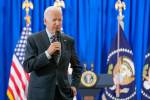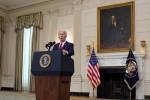Caucus turnout boosts hopes
Nevada Democrats are hoping Hillary Clinton isn't the only winner of the Jan. 19 presidential caucuses, the earliest nominating contest in the state's history.
The party's ultimate goal, after all, is to win elections, and the caucuses were meant to be a means to that end.
"The caucus wasn't just about helping to nominate a candidate in January," said Kirsten Searer, deputy executive director of the Nevada Democratic Party. "It was about organizing people to vote for a Democrat in November."
The stunning turnout -- at nearly 118,000 in the final tally, far more than anyone had expected -- showed people's enthusiasm for the Democratic candidates, Searer said. "This has given the Democratic Party in Nevada an unparalleled boost."
Turnout at the Republicans' less consequential caucuses was more than 44,000. But the Republican Party naturally disagrees with the idea that the disparate numbers signal Democratic victory on the horizon.
"When you look at Nevada, we're the state that pushed Bush over the top in 2004," state GOP Executive Director Zac Moyle said. "We've been the better grass-roots organization in the state (in previous elections), and there's a reason."
Republicans argue that their 44,000, although about one-third the Democrats' turnout, was an impressive showing because they decided to hold a caucus late, intentionally made theirs a smaller-scale effort and generally didn't draw candidates to campaign in the state.
Mitt Romney's landslide win in the Republican caucuses was seen nationally as something of a gimme, because he was the only candidate to build a large-scale campaign organization in Nevada.
Republicans decided to hold an early caucus precisely in order not to cede a potential organizing edge in November to the Democrats. Their 44,000, they point out, is a lot more than zero.
Like the Democrats, Republicans weren't expecting their turnout to be as high as it was and ran out of ballots on caucus day.
Moyle said the hard campaigning the top Democratic candidates did in Nevada will have consequences. Bitterness between supporters of Clinton and those of Barack Obama will make it difficult to unite the party around a general-election candidate, he said.
"Traditionally, they beat themselves up," Moyle said of Democrats. "That's why we continue to win elections."
One caucus-goer at Paris Las Vegas illustrated Moyle's point. Raymond Wadsworth, a pantry worker at Bally's, was one of many Obama supporters angered that many members of the Culinary union voted for Clinton rather than the union's preferred candidate.
"I'm going to be a delegate," Wadsworth said. "And I'll be an undecided before I vote for Hillary Clinton."
Democrats also are touting the roughly 30,000 new voter registrations they reaped at the caucus, people who either weren't previously registered to vote or were not previously registered as Democrats.
Voters were allowed to register as Democrats on the day of the caucus. Republicans didn't allow same-day registration; their caucus participants had to be registered Republicans for at least a month.
According to the secretary of state's office, as of December, before the caucus, the state had 499,850 registered Democrats and 480,437 registered Republicans. An additional 30,000 would be a significant advantage for the Democrats, particularly if many were converted Republicans.
The new voter registrations are being sent to county registrars to be recorded, party officials said. Clark County Registrar Larry Lomax said late last week he hadn't started receiving caucus-day registrations but expected them to come in this week.
Republicans question how many of the new registrations will turn out to be valid and how many are people who switched their party for a day with the intention of switching right back.
Obama's campaign in particular reached out to Republicans who might not vote for Clinton if she is the general election candidate.
Searer predicted the Democratic Party will keep a firm grip on its new registrants.
"Here's the beauty of it," she said. "If someone's willing to turn out to caucus, which is interactive and time-consuming, they're almost a lock for turning out for the general election in November. We have an army of people that we know are so committed to electing a Democrat to the White House, they'll take time out on a Saturday morning to participate in a caucus."
David Damore, a political scientist at the University of Nevada, Las Vegas, said the fight between the two Democrats fractured relationships within and between some Nevada unions, with the Culinary taking the biggest blow of all.
Even though the Culinary endorsement went to Obama, the rank and file who turned up at the at-large casino precincts were largely for Clinton.
Compounding that divide, the many members of the Democratic establishment who lined up behind Clinton found themselves pitted against their erstwhile allies in a fight that turned out to be more heated and vicious than many had imagined.
But there is a long time between Jan. 19 and Nov. 4, Damore said. "I think in the end they'll unify behind the Democratic candidate. Going early gives the party more time to heal the rifts among the various unions."
Once the battle is a partisan one, Democrats and their allies will have common purpose, he said.
"I'm sure there are grudges," Damore said. "But they're not as big as the grudges that the Democrats have with George W. Bush."
Political expert Stuart Rothenberg, editor of the Rothenberg Political Report newsletter, said the competitive Democratic contest in Nevada "could have two very different results" down the road.
"Certainly, it energized the Democrats, and it's possible that they'll stay enthusiastic and work hard for the party to turn out more voters," he said. Nevada Democrats "also got a lesson in what does work and what doesn't work. The Republicans didn't really have a test of the machinery."
On the other hand, Nevada marked the point in the Democratic contest where the tone of the race changed "in a way that is not necessarily favorable for the Democrats," Rothenberg said. "It has clearly become more personal, more bitter. The attacks may not be forgotten. You could have lingering bitterness, depending on how long the current nastiness continues."
The state has gone quiet from the political roar the caucuses brought, as the traveling circus of the campaign has moved on to its next battlegrounds. But Damore noted that the parties' county conventions next month, normally sedate affairs, could be lively given what's at stake.
Democrats and Republicans both elected precinct-level delegates on Jan. 19 who then can attend their county conventions. The Democrats will hold county conventions Feb. 23.
Of the 7,504 delegates to the Clark County Democratic Convention, up to 1,874 will be elected to go on to the state convention on April 19.
There the Clark County delegates will meet with their counterparts from the other 16 counties to elect 25 delegates to August's national convention in Denver. Another eight delegate positions are reserved for elected officials and other prominent Democrats who do not have to be elected to attend the convention.
Of the Clark County precinct delegates, 4,088 support Clinton, 3,275 support Obama and 116 support John Edwards. Another 25 represent candidates no longer in the running or are uncommitted.
All the precinct delegates are allowed to change allegiances. If Obama and Clinton both are still in the race in late February, there could be another delegate fight at the county convention, Clark County Democratic Party Chairman John Hunt said.
In previous years, fewer precinct delegates generally showed up to the county convention than the number of state convention slots available, so an election wasn't even necessary, Hunt said.
"If you attended the county convention, you automatically got to be a delegate," he said. "We'd just pass one motion approving everyone present to go to the state convention."
Hunt said he hopes to get convention registration packets in the mail to all the delegates and alternates this week. Online registration also will be available. On Jan. 19, each elected precinct delegate filled out a triplicate form, keeping one of the copies, while the other two were sent to the county party.
"Because the caucuses are nonbinding on the delegates, the county convention could have different results. One candidate's people might not show up, and that could change the whole dynamic."
Republicans can pick their own county convention dates, and not all the county conventions have been scheduled, including Clark County's.
Review-Journal writer Lisa Kim Bach contributed to this report. Contact reporter Molly Ball at mball@reviewjournal.com or (702) 387-2919.




























